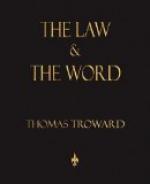We are told by some teachers, that we can in the same way even construct entities in the nature of our Thought, and possessing a personality of their own with which we have endowed them. Whether this be the case I cannot say—I do not know all the secrets of the invisible. But if our thoughts do not create personal entities able to hang “on their own hook,” they create forces which come to much the same thing. They start waves in the Universal etheric medium, which, like the electro-magnetic waves of telegraphy, spread all round from the point of initial impulse, and are picked up whenever a centre happens to be attuned to a similar rate of vibration, and each new centre energizes these vibrations again with a fresh impulse of its own; so in this way thought-currents become very real things.
Such, then, is the power of our Word, whether spoken or only dwelt upon in Thought, to impress itself upon the impersonal element around us, whether in persons or things. We cannot divest it of the power, though we may intensify its action by deliberate use of it, with knowledge of the principle involved, and therefore, whether consciously or unconsciously, we are sending out the influence of our personality all the time.
Now the more we know of these things the greater becomes our responsibility, and I would therefore solemnly warn the reader against any attempt to use the powers now indicated to the injury of any other person, or for the purpose of depriving any one else of that liberty of action which he would wish to enjoy himself. Such use of our mental powers is in direct opposition to the Law of Unity which I have spoken of; and since that Law is the basic principle of the whole Universe, any opposition to it places us in antagonism with a force immeasurably greater than ourselves.




